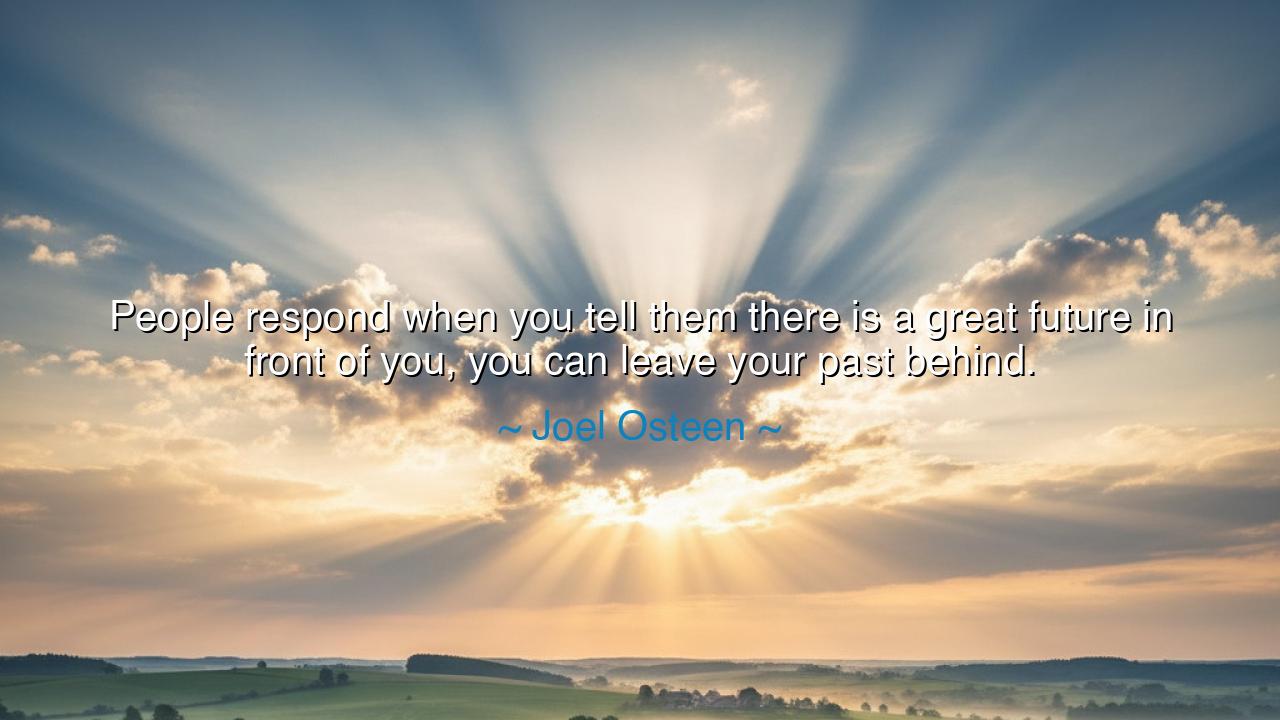
People respond when you tell them there is a great future in
People respond when you tell them there is a great future in front of you, you can leave your past behind.






The words of Joel Osteen — “People respond when you tell them there is a great future in front of you, you can leave your past behind” — are more than a message of optimism; they are a proclamation of spiritual renewal. Osteen, a modern preacher of hope and restoration, speaks in the voice of one who understands the weary heart of mankind — a heart burdened by regret, guilt, and disappointment. His words are not born of mere comfort but of faith in the transforming power of vision — the belief that no darkness of yesterday can eclipse the light of tomorrow. In this, his message echoes the ancient truths of prophets and philosophers alike: that human beings are not prisoners of their history but travelers toward their destiny.
At the heart of this teaching lies a sacred paradox — that the past cannot be changed, but its power can be broken. To tell a person, “You can leave your past behind,” is to remind them that memory is not a chain, but a teacher; that mistakes, though painful, are not life sentences, but lessons. Osteen’s words breathe into the soul a divine permission — the right to begin again. From the ashes of failure rises the seed of rebirth. The ancients would have called this redemption, the renewal of the spirit when it turns its gaze from what was lost to what may yet be gained. For life, in its deepest truth, is not a backward glance, but a forward march toward the promise of what can still become.
This message has ancient roots in every culture that has believed in the resilience of the human spirit. When the Hebrew people escaped Egypt, they carried not only chains but memories — the weight of bondage. Yet the command given to them was not to dwell on what had been, but to walk toward the Promised Land. The desert was not merely a journey through space, but through time — a shedding of old identities, old fears, and old failures. So it is with every human soul. The future, when it is seen with faith, becomes not a distant dream, but a living invitation to transformation. Osteen’s insight captures this eternal movement of the heart: that people awaken not by condemnation, but by hope.
The power of this truth can be seen in the story of Nelson Mandela, who spent twenty-seven years in prison for his fight against injustice. When he was finally freed, he had every reason to be consumed by bitterness. Yet instead of vengeance, he chose reconciliation; instead of reliving his pain, he chose to look forward to a new South Africa. His greatness lay not in erasing the past, but in refusing to be defined by it. Mandela’s life stands as living proof of Osteen’s words — that when a man believes there is a great future before him, he transcends even the deepest wounds of history.
In Osteen’s message there also lies a profound understanding of human nature: that people are drawn not to fear, but to possibility. The heart responds to hope the way the flower opens to sunlight. A leader, a teacher, or a friend who tells another soul, “You can begin again,” does more than inspire — they awaken the divine image within that person, the part of them that still believes they were made for more. Condemnation paralyzes; vision liberates. To speak of the future with faith is to unlock the creative power of belief itself — that mysterious energy that allows human beings to rise again, to rebuild, and to create new worlds from the ruins of the old.
Yet Osteen’s wisdom carries with it a sacred responsibility. To leave the past behind does not mean to forget it, but to forgive it — both others and oneself. The past must be honored for what it taught, but not worshipped as what defines. The ancients would have said: “The man who looks backward too long turns into stone.” True progress demands the courage to look ahead — to step beyond guilt, beyond fear, beyond nostalgia — and to walk with faith toward the unknown. This is not blindness, but bravery. For the one who believes in a greater tomorrow has already begun to live it today.
The lesson, then, is clear and timeless: never allow your past to dictate your destiny. Every sunrise is a silent declaration that yesterday is gone and today is new. Let go of the bitterness that chains you, forgive what cannot be undone, and focus your strength upon what lies before you. Speak hope — to yourself and to others — for words have the power to awaken the spirit and open the path of transformation. Osteen’s message is not merely encouragement; it is a spiritual principle: what you believe about your future shapes your life.
Therefore, let all who hear these words remember: your past is a chapter, not your story. The same hand that wrote your failures also holds the pen of your redemption. Look forward with courage, walk forward with faith, and speak forward with hope. For as Joel Osteen proclaims, there is a great future before you — and it begins the moment you choose to leave your past behind.






AAdministratorAdministrator
Welcome, honored guests. Please leave a comment, we will respond soon